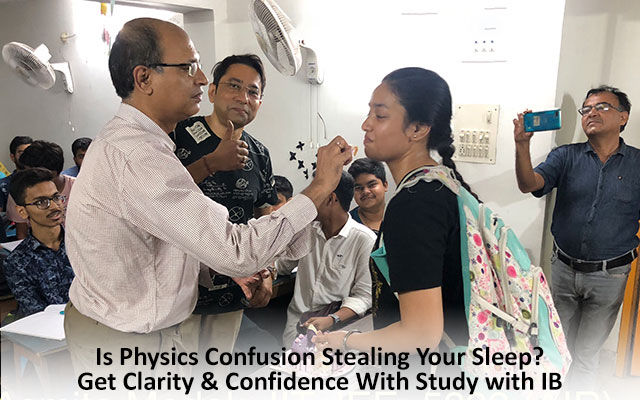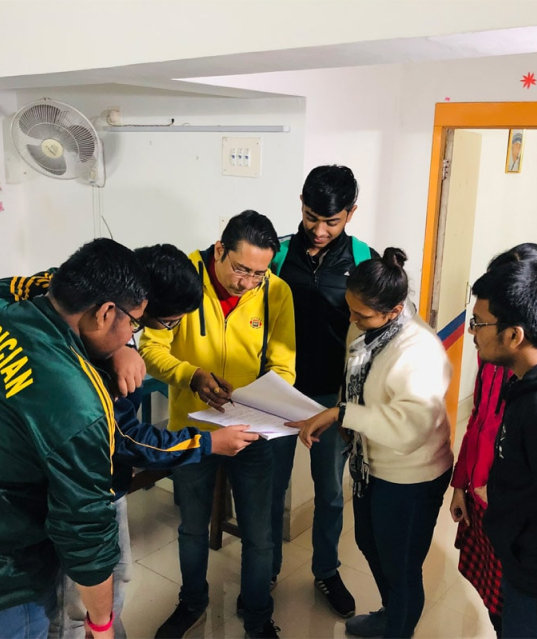Does physics feel like a confusing mess, no matter how much time you give it? You read a chapter, try to solve problems, and yet nothing seems to stick.
You find yourself cramming formulas and still failing to apply them when it matters.
If this sounds familiar, you’re not alone.
Physics is a subject that can cause real frustration, especially when it starts to feel like a giant wall you can’t break through.
But here’s the thing, it’s not your fault. Often, the approach to learning physics is the problem, not your ability.
Memorising formulas without understanding the logic behind them is like trying to drive with a blindfold. You might move a little, but you are bound to crash eventually.
The good news? With just a few simple shifts in how you study, physics can go from being your biggest fear to one of your strongest subjects. Let’s walk you through it.
Understanding Physics Starts with a Mindset Shift
The first thing to understand is that physics is not about mugging up formulas. It’s about knowing why things work the way they do.
Think about it: When you’re asked to solve a problem on projectile motion or electricity, the question isn’t just “which formula should I use?” It’s also “why does this situation behave this way?”
Once you get that part, you will find applying the formula much easier. Many students who struggle with physics are simply focusing on the wrong thing.
They are treating physics like history — read, remember, repeat. However, physics is more akin to solving puzzles. You need to understand the rules before you can play the game well.
Why Physics Isn’t as Hard as It Seems?
It’s easy to say “physics is tough.” But is it really?
What makes physics seem difficult is the disconnect between concepts and their applications. When your foundation is weak, even simple questions feel impossible.
Start focusing on the concepts. Give yourself time to understand each one. Visualise what’s happening. Use real-life examples. Ask questions like, “What happens if I increase this variable?” or “What will change if gravity is removed?” These questions build curiosity and clarity.

Understanding vs Memorising: The Real Deal
Let’s get this straight, memorising might help you pass, but it won’t help you succeed.
Sure, you might remember a formula like v = u + at, but do you understand what each symbol means? What happens when time increases? Or when acceleration is negative?
That’s the difference between a top scorer and an average one. When you understand the principle behind a formula, you can use it even in tricky or twisted questions.
When you rely only on memory, even the slightest change in the question will throw you off.
So, how do you build this understanding? Let’s take a look at some practical steps.
Tips to Solve Physics Numericals Effectively
Solving numericals is where many students struggle. But the solution isn’t more practice, it’s more innovative practice.
1. Identify the Known Values
Start by writing down what’s given in the problem — speed, mass, acceleration, distance, etc. It helps you figure out what’s missing.
2. Pick the Right Formula
Once you know what you’re solving for, choose a formula that connects the given values with the unknown. Don’t rush, pause and think it through.
3. Check the Units
Never plug values in without checking their units. Converting kilometres to metres or minutes to seconds can change your answer completely.
4. Calculate Carefully
Use a calculator if allowed. If not, go slow. One small mistake in multiplication or a sign can ruin a perfect solution.
5. Review Your Steps
Go back over what you did. See if everything flows logically. This is where most silly mistakes get caught.
Avoiding Common Errors in Physics
Mistakes are part of learning, but there are ways to reduce them:
1. Don’t Skip Concepts
It’s tempting to jump to numericals, but if you don’t understand the theory, you will keep making errors. Read slowly, understand the logic, and visualise it.
2. Practice Different Types
Don’t limit yourself to just one type of question. Solve objective, subjective, conceptual, and numerical problems. The more variety you cover, the more flexible your brain becomes.
3. Break the Problem Down
Instead of solving a problem all at once, break it down into smaller chunks. For example, solve for acceleration first, and then proceed to velocity or distance.
4. Don’t Be Afraid to Ask
Whether it’s your friend, sibling, or teacher — asking for help is smart, not weak. Sometimes a 2-minute explanation clears up what 2 hours of studying couldn’t.

One of the fastest ways to get clarity in physics is to learn from someone who makes it simple. That’s where IB Sir comes in.
Known as one of the best physics teachers in Kolkata, IB Sir has spent over two decades helping students decode the subject. His students don’t just memorise — they understand.
Here’s what makes his approach work so well:
- Concept-first learning: He focuses on building a rock-solid understanding before introducing formulas.
- Step-by-step problem-solving: Every problem is broken down logically so you don’t get lost halfway.
- Real-world examples: He connects physics to real life — making topics like magnetism, electricity, and motion feel relevant and exciting.
- Confidence building: His students stop fearing physics because they finally “get it.”
- Proven success stories: Many of his students have cracked major exams and topped the boards after following his methods.
Whether you are struggling with basics or want to level up for competitive exams, his style of teaching bridges the gap between confusion and clarity.
Take Control of Your Physics Journey
Physics doesn’t have to be a nightmare. With the right mindset, clear concepts, and guided practice, it can actually become one of your strongest subjects.
Set up your study space, be consistent, ask questions, and choose mentors who simplify, not complicate.
If you’re looking to learn from someone who’s helped countless students transform their relationship with physics, start learning from IB Sir. He is widely respected as the best physics teacher in Kolkata.
Say goodbye to sleepless nights and hello to clarity, confidence, and control.
Want to achieve your best in Physics?
Join IB sir’s class, the best physics teacher in Kolkata, to begin your journey from confusion to clarity.
People Also Ask:
1. How do I know if I’m learning physics the right way?
If you can explain a concept in your own words and solve problems without looking at solutions, you are on the right track. Struggling is normal, what matters is improvement over time.
2. What if I’m starting late in the year? Can I still catch up?
Absolutely. With a focused plan, the right mentor, and daily effort, even last-minute preparation can be effective. Prioritise high-weightage topics and work on weak areas first.
3. How can I improve my accuracy in physics exams?
Practice timed tests regularly. Review your mistakes after each test. Keep a notebook of errors so you don’t repeat them. Most importantly, stay calm during the exam.
4. Are physics apps and online tools helpful for learning?
Yes, apps like PhET simulations or YouTube channels can help you visualise difficult concepts. But use them as support — not substitutes for regular study and practice.





